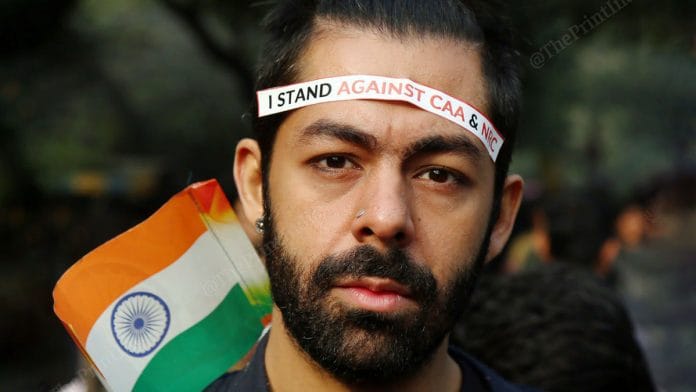New Delhi: The Kerala Assembly passed a resolution Tuesday demanding the scrapping of the controversial Citizenship Amendment Act (CAA), amid raging countrywide protests against the law fast-tracking citizenship for Hindus, Sikhs, Parsis, Buddhists, Christians and Jains from Bangladesh, Afghanistan and Pakistan.
The House adopted the resolution, moved by Chief Minister Pinarayi Vijayan against the implementation of the CAA, which was also supported by the Congress-led UDF opposition.
A day later, Law Minister Ravi Shankar Prasad said there would be “no escape” from the citizenship law since it is in the Union list and states were mandated to implement it as it was passed by Parliament.
There were also reports that the central government was considering taking the process of granting citizenship online to bypass states that are dead set against the new legislation.
Amid continued protests against the law, ThePrint brings you how it will be implemented and the role of states in executing it.
Also read: This is why Modi will win the war protesters have waged against him on CAA
How does one apply for citizenship?
There are four methods of acquiring citizenship in India — by birth, descent, registration and naturalisation.
In the current context of protests, the naturalisation process is the one in focus.
According to the original 1955 Citizenship Act, citizenship by naturalisation can be obtained by a foreigner (not an illegal migrant) who has been a resident of India for 12 years.
The 2019 amendment changes that.
Now, all Hindus, Sikhs, Jains, Buddhists, Christians and Parsis from Bangladesh, Afghanistan and Pakistan who entered India before 31 December 2014 will be granted citizenship.
Thus, through this amendment, a person entering India even on 31 December 2014 can be granted citizenship in 2020 even though the person will have been in India for only 5 years as against the previous requirement of 12.
The rule, though, remains unchanged for Muslims from these three countries.
Also read: Bengal, Punjab & Kerala refuse to roll out citizenship law. But can they?
How does state govt come into the picture?
The new citizenship by naturalisation process has extensive involvement of the government of the state they are residing in.
First, the applicant has to submit a written undertaking that they will renounce any other citizenship immediately if their request for Indian citizenship is granted.
The Indian Citizenship Rules, 2009, specifies that after the form and documents are in order, “an application for registration under section 5 or naturalisation under section 6 shall be made to the Collector within whose jurisdiction the applicant is ordinarily resident”.
The forms and documents include a police clearance certificate establishing the applicant’s residence and conduct.
The collector is a state government authority. This is where state governments like West Bengal and Kerala, who are opposed to the CAA, can create hurdles for the smooth implementation of the procedure.
The 2009 Rules also state that the collector needs to be “satisfied about the correctness of the particulars of the application and before forwarding the application to the State Government or the Union territory Administration”.
This means that if the collector is not “satisfied” with the application, the forms are not processed and, therefore, the Ministry of Home Affairs does not come into the picture.
Also read: Why Sardar Patel would have opposed NPR, NRC and CAA
How does MHA examine applications?
After the state government is done with the scrutiny, the application is forwarded to the Ministry of Home Affairs. But if there are issues with the application, the ministry asks the state government to inform the applicant of the defects and the application returns to the state government.
Will there be any role for a state govt if process goes online?
Even if the central government does away with the collector and state government by taking the process online, a police clearance certificate is still needed.
The police of any state — not union territory — is under the state government as it is a part of law and order, which is a state subject.
Again, it is at this level that a state can create a hurdle for the central government.
Also read: Why India should shelve NPR, the National Population Register






